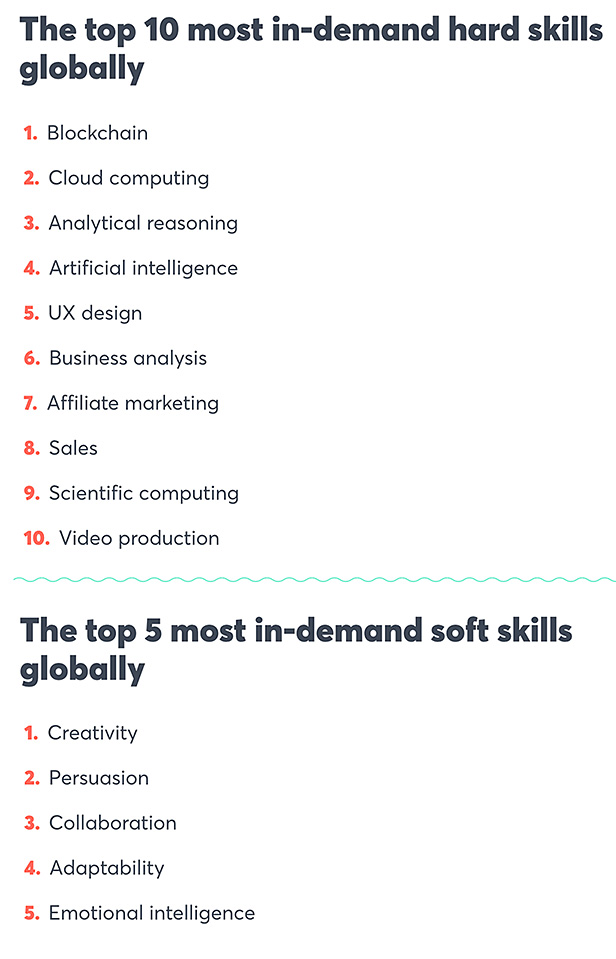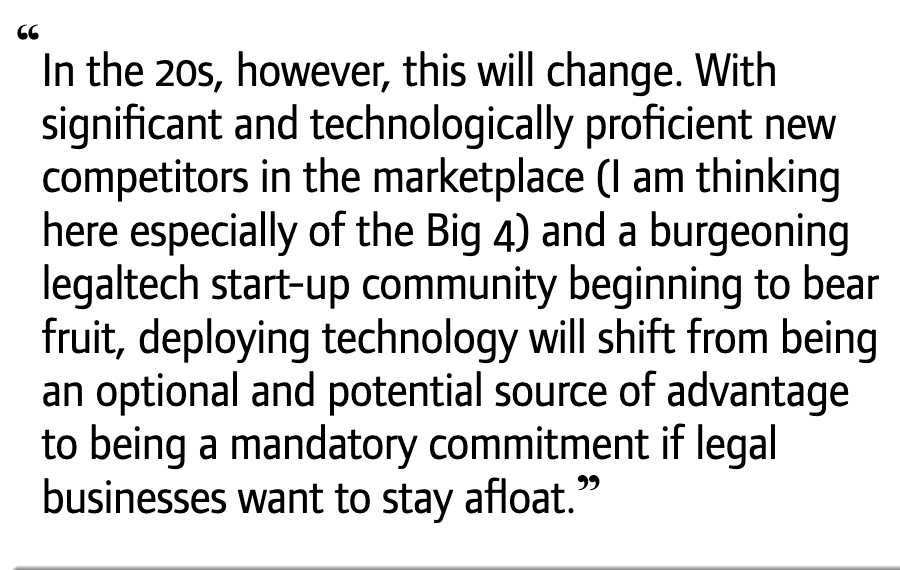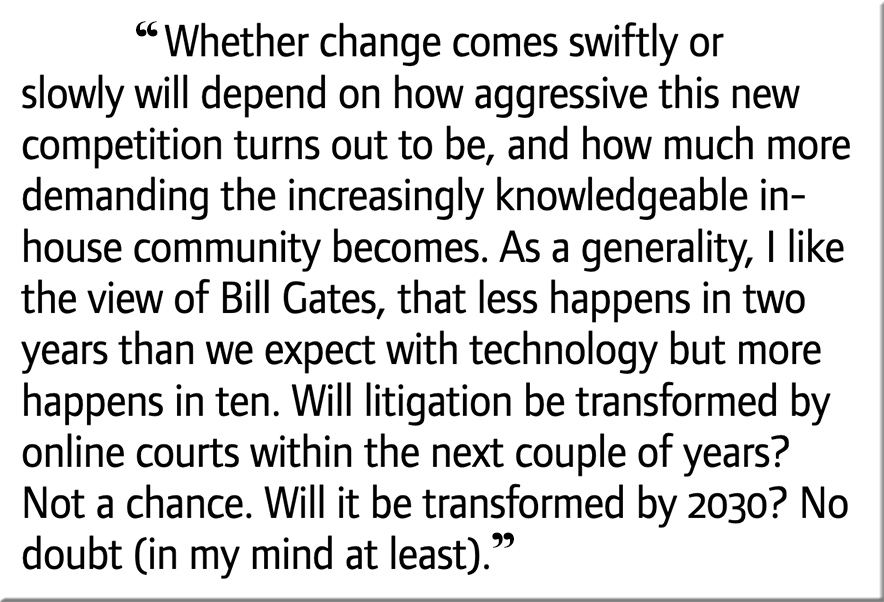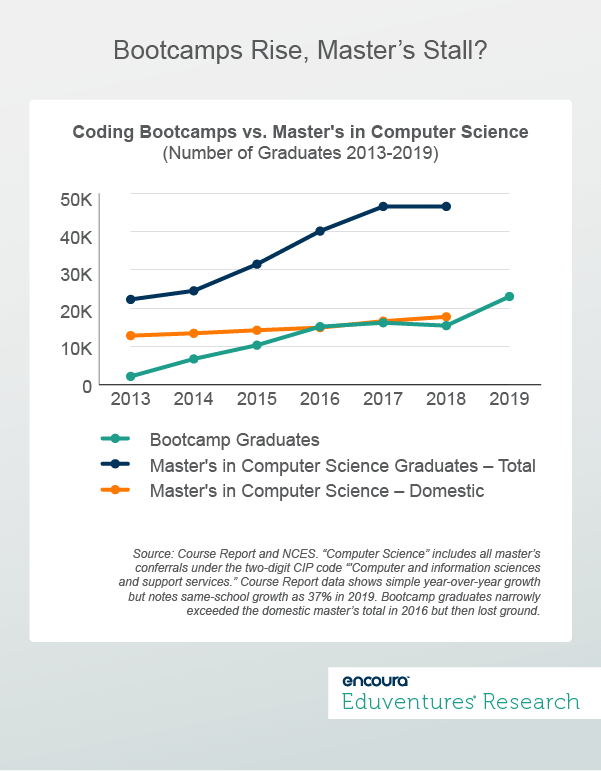These are the most in-demand job skills in 2020, according to LinkedIn — from cnbc.com by Vicky McKeever
Blockchain is the most in-demand job skill in 2020, says LinkedIn
Why the traditional US model of educating tomorrow’s lawyers must change — from iam-media.com by Megan Carpenter
Disruption is increasingly affecting the legal services industry but legal education is not evolving fast enough. Greater specialisation in areas like IP, argues Franklin Pierce School of Law dean Megan Carpenter, could improve the training of lawyers and non-lawyers alike
Excerpt (emphasis DSC):
But the legal education we need today is not the one-size-fits-all model of the past. For 150 years, law schools and the legal services industry have combined to make legal education a precious commodity, bundled in a very specific way. Like the cable industry or print news media of yore, the education that qualifies people for the legal profession in the US has been one-size-fits-all, without regard to particular practice areas or specialisations and without responding to the diversification of the legal services market.
The legal profession should take a page from the playbook of the medical profession here. Under “healthcare occupations”, the US Bureau of Labor Statistics Occupational Outlook Handbook lists 46 professions, from doctors and nurses to physician assistants, medical extenders, technologists and technicians. Yet, under “Legal Occupations”, the BLS Handbook lists only five positions. By failing to adapt like the medical industry has to a variety of roles for different types of legal professionals, including education that fits those roles, the haves and have-nots of legal knowledge have been defined in a way that is not sustainable and fails to reflect the needs of the marketplace.
Law schools should not resist the expanding market for alternative legal service providers and legal tech; rather, they should lead the charge to provide legal education to people who need it, even if in a different form than such education has taken in the past. There should be more undergraduate and community-college programmes that provide appropriate legal training. The University of Arizona College of Law launched the first undergraduate bachelor degree in law in the US in collaboration with the broader university and other schools should do the same.
From DSC:
I’ve also been thinking about the need for more specializations within law schools, the legal realm, and in the Bar Exam itself.
Excerpt from Higher Education Predictions for 2020: Recession, Certificates, and Computer Science by Richard Garrett
Coding bootcamps, the educational innovation that arose over the past decade to tackle an acute supply-demand crunch in computer science, had a stellar year in 2019. Dismissed as a fad by some, in 2019, bootcamps graduated 23,000 people, up 49% in one year (37% on a same-school basis).
…
But short of an unprecedented surge in domestic master’s degrees awarded in 2019, that year will mark the turning point when bootcamps—dominated by U.S. students— unequivocally passed master’s degrees.
…
An intriguing question is: what impact does a university’s own bootcamp have on domestic enrollment in its computer science master’s program: complementary or competitive? That will have to wait for another Wake-Up Call.
‘Fundamental shift’ is transforming the delivery of legal services, new report concludes — from abajournal.com by Debra Cassens Weiss
Excerpt:
“Revolutionary changes are afoot” in the market for legal services, according to a new report.
Clients are actively managing their relationships with outside counsel, nonlaw competitors are gaining ground, and law firms are responding to market changes in innovative ways, the report says.
The 2020 Report on the State of the Legal Market was released Monday by Georgetown Law’s Center on Ethics and the Legal Profession and Thomson Reuters Legal Executive Institute. It is available for download here.
However, taking that view is seeing only one side of the story. Over this same period, there has been mounting evidence that the underlying model itself is changing, that clients, non-law firm competitors, and even many law firms are now operating with very different assumptions about the role law firm services should play in the legal ecosystem and how such services should be delivered. In the past year or so, this evidence has grown to the point that it seems apparent that a fundamental shift is now well underway.
Also see:
- A Future Focus: The Success of Legal Tech Depends on Transformation, Not Automation — from law.com by Zach Warren
Legal technology has incrementally shifted law in recent years, but true transformation isn’t incremental. The next decade has the potential to change that. - Legal Tech’s Predictions for Legal Innovation in 2020 — from law.com by Zach Warren
From blockchain and cryptocurrency to new skillsets for lawyers, here’s what lawyers and technologists see as the future of law—coming in 2020.
Lori Lorenzo, research and insights leader of chief legal officer program, Deloitte: “Catching-up and keeping-up with tech advancements for the legal function will remain a top goal for chief legal officers in 2020. Of course, addressing legal team tech skills gaps may drive inclusion of professionals with diverse skillsets, like data scientists, automation experts and the like, into the legal function.”
8 digital transformation trends for 2020 — from enterprisersproject.com by Stephanie Overby
Having some digital transformation fatigue on your team? You’re not alone: Here’s what else to watch for in the year ahead, digital leaders
Excerpts:
“2020 will still see the rapid scaling of digital initiatives across industries,” says Steve Hall, partner and president of global technology research and advisory firm ISG. “In many areas, CIOs and organizations have prepped their organizations for change but haven’t made the full leap to transforming their culture to fully embrace the change.”
Trends mentioned include:
- Digital operating models become mandatory
- More data, more problems
- AI takes center stage
- M&A shakes up IT services
- New digital transformation allies emerge
- Public cloud adoption expands
- New digital transformation metrics will emerge
- IT takes the long view on digital insights
Legal Tech Broke Investment Record in 2019 as Sector Matures — from biglawbusiness.com by Sam Skolnik
Excerpts:
- Investments in legal tech soared past $1 billion in 2019
- Key legal tech conference boasted record attendance
Legal technology deals and investments stayed on a fast track in 2019 as the sector becomes increasingly relevant to how Big Law firms and corporate legal divisions operate. Legal tech investments flew past the $1 billion mark by the end of the third quarter. It hit that mark for the first time the year before.
Also see:
- Legal Tech’s Predictions for E-Discovery in 2020 — from law.com by Zach Warren
From ephemeral messaging to global expansion and beyond, lawyers and technologists believe e-discovery will show no signs of stagnation in 2020.
“E-discovery sits at the intersection of two industries not known for diversity: legal and high-tech. Despite what can feel like major wins, statistics paint a bleak picture—most U.S. lawyers are white, managing partners are primarily male, and only 2% of partners in major firms are black; leadership at e-discovery companies has historically reflected this demographic. The next decade will see a major shift in focus for leadership and talent development at e-discovery providers as we join law firms and corporate legal departments in putting our money where our mouths are and deliver recruitment and retention programs that fight discrimination and actively recruit, retain, and promote women, minority, and underserved talent.”
Sarah Brown, director of marketing, Inventus
















